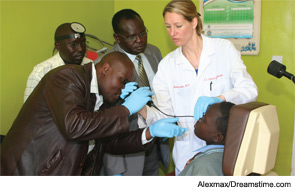They finance their own travel, volunteer long hours and often face a heartbreaking need for medical care. But when otolaryngologists describe their surgical missions, it’s clear that the rewards outweigh the hardships. Lisa Buckmiller, MD, associate professor in the department of pediatric otolaryngology at the University of Arkansas for Medical Sciences and director of the Vascular Anomalies Center of Excellence and the Cleft Lip and Palate Team at the Arkansas Children’s Hospital in Little Rock, speaks for many of her colleagues when she says: “[Going on a surgical mission] reminds me of the very basics of medicine in the purest sense: It’s all about helping and healing someone.”
Explore This Issue
June 2012However, some authors have suggested that medical missions can produce unintended negative consequences (World J Surg. 2010;34:466-470). Building on this theme, we asked six otolaryngologists to share the rewards and sometimes difficult decisions they have faced while doing humanitarian work. Drs. Cordes, McMains and Boston participated as panelists in a mini-seminar last September titled “Avoiding the Deadly Sins of Humanitarian Missions: Doing Good Better,” cosponsored by the American Academy of Otolarynology-Head and Neck Surgery (AAO-HNS) Humanitarian Efforts and Ethics committees.

Question: I understand that you have been participating in medical missions since you trained at the department of otolaryngology at the University of California, Davis. Now that you have a busy academic practice, what keeps you going back?
Lisa J. Buckmiller, MD: [Participating in surgical missions] is a wonderful experience. Here in the U.S., there’s a lot of paperwork and bureaucracy. When you go to a third world country where they don’t have access to medical care as we do, you are able to give people an opportunity to have a repair with a very visual impact.
World Medical Missions was the first mission organization I joined when I was a resident, and I have been going on missions with them since 1998. I’ve now been back to the same site in Kenya 11 or 12 times, where we do cleft lip and palate work. I’ve also been to China and Guatemala, and every place has different beliefs associated with medical problems. But in Kenya, people look down on those with physical deformities, as if they are being punished for some reason. It is difficult for the whole family to live with this condition. So you’re really affecting the entire family when you’re able to fix something like that.
Leave a Reply